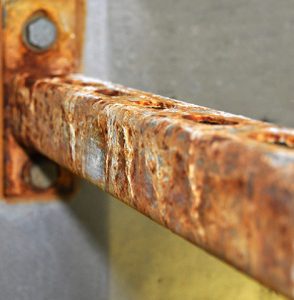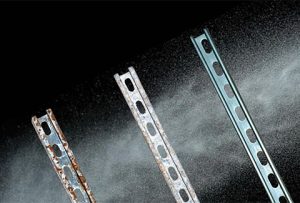As an installer, you work a lot with steel. An excellent material but it does have a substantial disadvantage: it rusts. What is the best possible way to prevent corrosion of the installation and fixing materials? We would like to
explain how.

All ferrous materials, such as steel and even stainless steel, will rust. Therefore it is no wonder that your installations after a certain period of time will start to corrode if it is not handled or treated properly.
Rust expands the material and distorts the installation in the long run. In addition the iron-containing installation and fixing material can become so rusted, that holes appear. Of course, you would like to avoid this and fortunately you can.
Exposure to oxygen and water is the beginning of the corrosion process. Oxygen is in the air, so there is nothing you can do to prevent this. However you can do something about the water. For example you can determine the humidity of the room in advance. If the area has a high humidity, the material has to have a higher resistance to corrosion.
Solutions to avoid rust include installation and fixing materials made of galvanised material, stainless steel or powder-coated material. Furthermore, galvanised material is also available in varying degrees of corrosion resistance. This is useful as installation material used on dry spots in the building, do not have to be heavily galvanised.
In theory, the distinction between the different degrees of resistance to corrosion is evident. However in practice, various types are often used interchangeably. The term ‘galvanised’ does not always mean that the material is rust resistant for your situation.
There is for example, galvanised material available which is perfect for use inside the building. But if this material is used outdoors, it would nevertheless soon begin to rust. As an installer it is therefore important to make a good assessment for each specific situation. You must not only take into account the air conditions and the surrounding environment. But also consider the material in mind to determine the appropriate corrosion class (C1-C5). Is there a thicker layer of zinc or another alloy needed for your situation?

If you definitely want to be sure that your installation and fixing materials have a very high corrosion resistance, Walraven BIS UltraProtect® 1000 is exactly what you need. The products of Walraven BIS UltraProtect® 1000 can effortlessly withstand a salt spray test of at least 1000 hours* (according to ISO 9227). Ideal for mechanical installations, solar systems and many other types of installations, both indoors and outdoors.